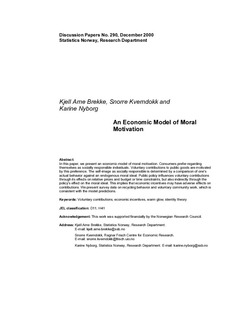| dc.contributor.author | Brekke, Kjell Arne | |
| dc.contributor.author | Kverndokk, Snorre | |
| dc.contributor.author | Nyborg, Karine | |
| dc.date.accessioned | 2011-11-28T10:09:23Z | |
| dc.date.available | 2011-11-28T10:09:23Z | |
| dc.date.issued | 2000 | |
| dc.identifier.issn | 1892-753x | |
| dc.identifier.uri | http://hdl.handle.net/11250/180045 | |
| dc.description.abstract | Abstract:
In this paper, we present an economic model of moral motivation. Consumers prefer regarding themselves as socially responsible individuals. Voluntary contributions to public goods are motivated by this preference. The self-image as socially responsible is determined by a comparison of one's actual behavior against an endogenous moral ideal. Public policy influences voluntary contributions through its effects on relative prices and budget or time constraints, but also indirectly through the policy's effect on the moral ideal. This implies that economic incentives may have adverse effects on contributions. We present survey data on recycling behavior and voluntary community work, which is consistent with the model predictions. | no_NO |
| dc.language.iso | eng | no_NO |
| dc.publisher | Statistics Norway, Research Department | no_NO |
| dc.relation.ispartofseries | Discussion Papers;No. 290 | |
| dc.subject | Moral motivation | no_NO |
| dc.subject | Identity theory | no_NO |
| dc.subject | Voluntary contributions | no_NO |
| dc.subject | Eeconomic incentives | no_NO |
| dc.title | An Economic model of moral motivation | no_NO |
| dc.type | Working paper | no_NO |
| dc.subject.nsi | VDP::Social science: 200::Economics: 210::Economics: 212 | no_NO |
| dc.source.pagenumber | 25 s. | no_NO |
